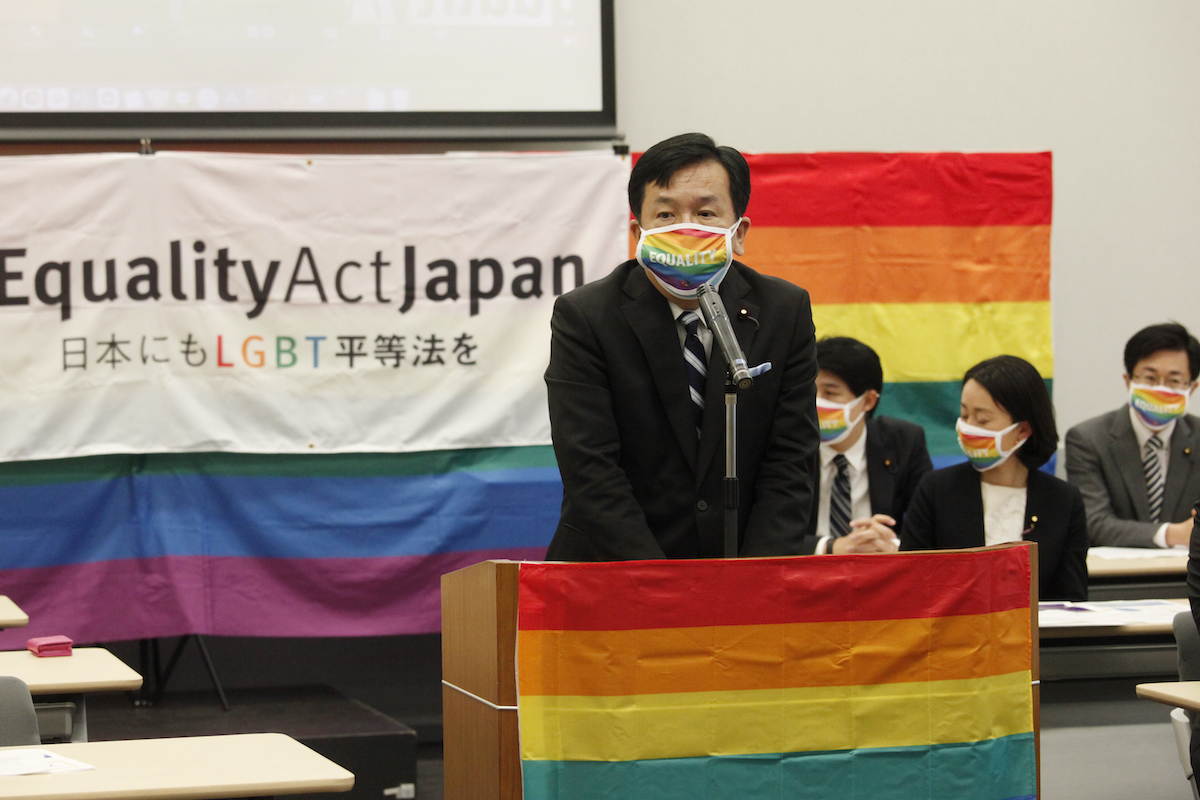In Japan, the argument as to whether or not to legalize gay marriage has been ignited over the last several months in the wake recent court cases. According to NPR, six individuals—two male couples and one female couple—sued the government of Japan earlier this year due to “the pain of not being able to legally marry.”
While they did not win the case, the District Court of Sapporo recognized that the ban on gay marriage was unconstitutional, according to Article 14 of the Japanese Constitution in their ruling on March 17. The Article states in part, “All of the people are equal under the law, and there shall be no discrimination in political, economic or social relations because of race, creed, sex, social status or family origin.”
This ruling by the District Court of Sapporo encouraged supporters of gay marriage that Japan might be moving toward equality for the LGBTQ+ population.
“It’s like a dream. Now the government only needs to act,” said a plaintiff in the case, according to Kyodo News.
According to a poll conducted in 2018, 78.4% of the 60,000 Japanese people surveyed supported gay marriage.
“One advantage Japan has is there is not a religious tradition that lends itself to an interpretation that leads to hatred of [gay people], as there is here in the United States,” said Dr. Kenneth Ruoff, history professor and director of the Center for Japanese Studies at Portland State University.
However, Japan still has a long way to go when enacting change on a national level.
“There is a significant struggle going on regarding formal, legal recognition of LGBT rights, with many victories at the level of localities, but not yet at the national level,” said Ruoff. “However, there are many previous examples in Japan (and elsewhere) of movements, once successful at the local level, of achieving success at the national level.”
While the victory in Sapporo was indicative of a country that was starting to recognize the rights of the LGBTQ+ community, things are not progressing the same way on the national level.
Kyodo News reported that three-term law maker in Japan’s House of Representatives Kazuo Yana reportedly said that being LGBTQ+ goes against biology and the preservation of the species during a meeting on May 20.
According to The Mainichi, Koji Shigeuchi, advisor to the ruling Liberal Democratic Party’s committee to study sexual orientation and gender identity, reportedly presented a study session titled “LBGT out of control,” where transgender women were portrayed as a threat to cisgender women, on March 26.
“Japanese officials insulting LGBT people is not new, but it is increasingly out of touch with Japanese public opinion and the government’s place on the world stage,” wrote a statement by Human Rights Watch. “LDP legislators are out of line. Other LDP leaders should override their ugly rhetoric and pass the Equality Act immediately.”
The LGBT Equality Act, a bill that the Liberal Democratic Party in Japan had stated that they wanted to pass before the end of the National Diet session in June, does not include protection against discrimination for the LGBT community.
The only governmental responsibility that would come about because of the law is to “promote understanding of LGBT people.” Furthermore, this bill did not reach fruition as conservative members within the Liberal Democratic Party could not reach a consensus, and, on May 28, it was announced that the Liberal Democratic Party was abandoning plans to submit the bill before the end of the Diet session.
“It’s major progress that Japan’s political parties are discussing LGBT-related legislation, but many LGBT people in Japan still remain in the closet, unable to discuss with others out of fear and stigma,” said Yuri Igarashi, director of the Japan Alliance for LGBT Legislation.
The failure to pass any anti-discrimination also drew backlash with the Summer Olympic Games—which will be held in Tokyo—less than two months away.
“With the Olympic Games approaching, a law prohibiting discrimination on the basis of sexual orientation and gender identity is urgently needed to protect LGBT people, not only athletes and spectators, but everyone in Japan,” said Igarashi.
“In order to protect the lives and livelihood of sexual minorities, enacting a LGBT law that states discrimination is not tolerated is an indispensable first step,” said Kane Doi, Japan director of Human Rights Watch. “An enactment of such a law in Japan ahead of the Olympics is also necessary for the international community.”
As discussions on LGBTQ+ rights continue, not just in Japan but throughout the world, the spirit of the Olympic Games brings hope to supporters of LGBTQ+ rights.
“This year, all eyes will be on Japan,” said Matt Beard, executive director of All Out, an international organization that focuses on promoting LGBTQ+ rights. “In these trying times, the Olympic Games will be a welcome and much-needed celebration of humanity in all its beautiful diversity. By granting LGBT people protection from discrimination, Japan can prove that it truly supports the Olympic spirit of promoting tolerance and respect.”






